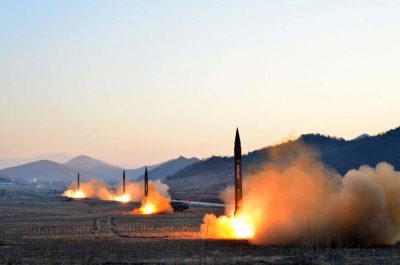North Korea fires fresh missiles in response to US sanctions
North Korea on Friday fired what appeared to be two short-range ballistic missiles in its third weapons launch this month, officials in South Korea said, in an apparent reprisal for fresh sanctions imposed by the Biden administration for its continuing test launches.
South Korea’s Joint Chiefs of Staff said the missiles were fired 11 minutes apart from an inland area in western North Pyongan province, where North Korea is known to operate key missile bases and has frequently conducted test launches in recent years.
The missiles flew 430 kilometers (267 miles) cross-country on a maximum altitude of 36 kilometers (22 miles) before landing in the sea, the military said.
Japan’s coast guard urged vessels to pay attention to falling objects, but Chief Cabinet Secretary Hirokazu Matsuno said there were no reports of damage to vessels or aircraft.
Hours earlier, North Korea issued a statement berating the Biden administration for imposing fresh sanctions over its previous missile tests and warned of stronger and more explicit action if Washington maintains its “confrontational stance.”
The sanctions targeted five North Koreans over their roles in obtaining equipment and technology for the North’s missile programs in its response to the North’s missile test this week. Washington also said it would seek new U.N. sanctions.
The test-launch of a hypersonic missile on Tuesday — the second in a week — was overseen by leader Kim Jong Un, who said it would greatly increase his country’s nuclear “war deterrent.”
North Korea has been ramping up tests of new, potentially nuclear-capable missiles designed to overwhelm missile defenses in the region. Some experts say Kim is going back to a tried-and-true technique of pressuring the world with missile launches and outrageous threats before offering negotiations meant to extract concessions.
Following an unusually provocative run in nuclear and long-range missile tests in 2017 that demonstrated the North’s pursuit of an arsenal that could target the American homeland, Kim initiated diplomacy with former President Donald Trump in 2018 in an attempt to leverage his nukes for economic benefits.
But the negotiations derailed after Kim’s second summit with Trump in 2019, when the Americans rejected his demands for major sanctions relief in exchange for a partial surrender of the North’s nuclear capabilities.
Kim has since pledged to further expand a nuclear arsenal he clearly sees as his strongest guarantee of survival, despite the country’s economy suffering major setbacks after it shut its borders during the pandemic as well as persistent U.S.-led sanctions.
[Associated Press]


